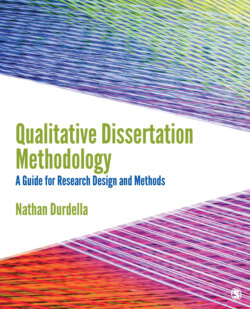Читать книгу Qualitative Dissertation Methodology - Nathan Durdella - Страница 80
На сайте Литреса книга снята с продажи.
An iterative approach to dissertation methodology development.
ОглавлениеDeveloping dissertation methodology through chapter sections generally follows the work of qualitative researchers who use their study’s background—problem, purpose, and question—to direct what they do in the field. While the conceptualization process of systematic approaches to investigations can be messy—first you identify the group or population of interest, then you think about steps in the context of data collection, then the problem or gap in what we know about all of this—when pen goes to paper or fingers to keyboard, the process takes a bit more shape and follows what we see in published journal articles, reports, or monographs. That is, one methodological component leads to and connects with another—flowing logically from one step of gathering and making sense of information to the next.
Source: © iStockphoto.com/ photovideostock
While methodology development is not as neat as what appears in publications or presentations, the evolutionary tendencies of research purpose and questions often inform changes over time and are shaped by and shape methodology. Indeed, if you had access to a researcher’s or researchers’ draft files that lead to a published journal article, for example, you would likely discover previous versions of research questions and purpose and iterations of methodology. In student dissertation contexts, we see this pattern, too, as in the following example, listed by doctoral program year:
Years 1–2: Therefore, the purpose of this study will be to examine the college experiences of African American females in their senior year at a Minority Serving Institution (Wright, September 2012, p. 2).
Years 2–3: Therefore, the purpose of this phenomenological case study will be to examine the college experiences of eight African American females who have persisted to their senior year at a minority-serving institution (MSI) that is not a historically Black college or university (Wright, December 2012, p. 2).
Years 3+: This study employs Critical Race Theory and Womanism to guide a qualitative examination of college experiences of African American women who have graduated or successfully persisted at a minority-serving institution (MSI) that is not classified as a historically Black college or university (HBCU) (Wright, 2014, p. x).
